2022届高考英语语法专题倒装,强调,省略课件(46张ppt)
文档属性
| 名称 | 2022届高考英语语法专题倒装,强调,省略课件(46张ppt) |  | |
| 格式 | zip | ||
| 文件大小 | 141.3KB | ||
| 资源类型 | 教案 | ||
| 版本资源 | 通用版 | ||
| 科目 | 英语 | ||
| 更新时间 | 2022-03-02 21:49:41 | ||
图片预览


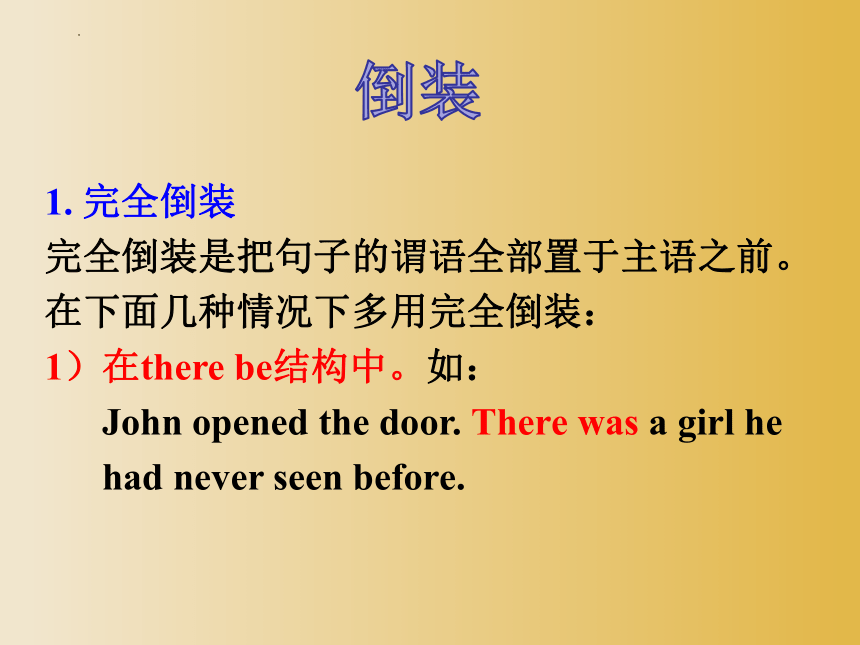
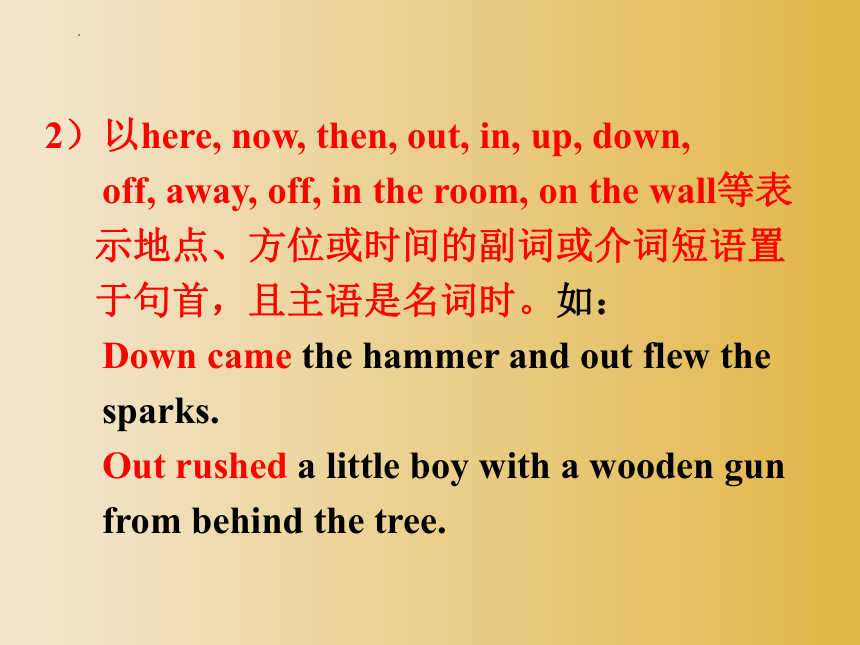


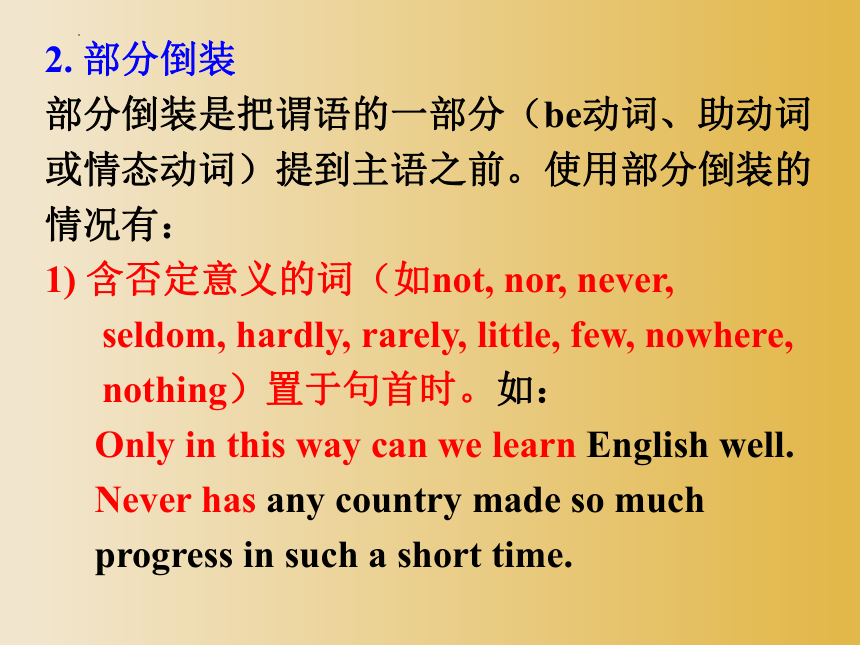
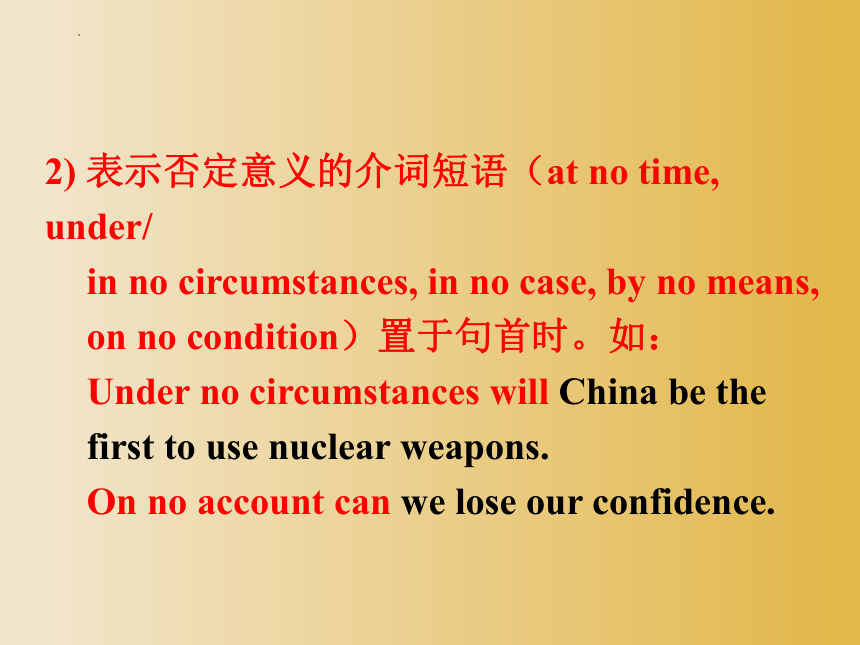
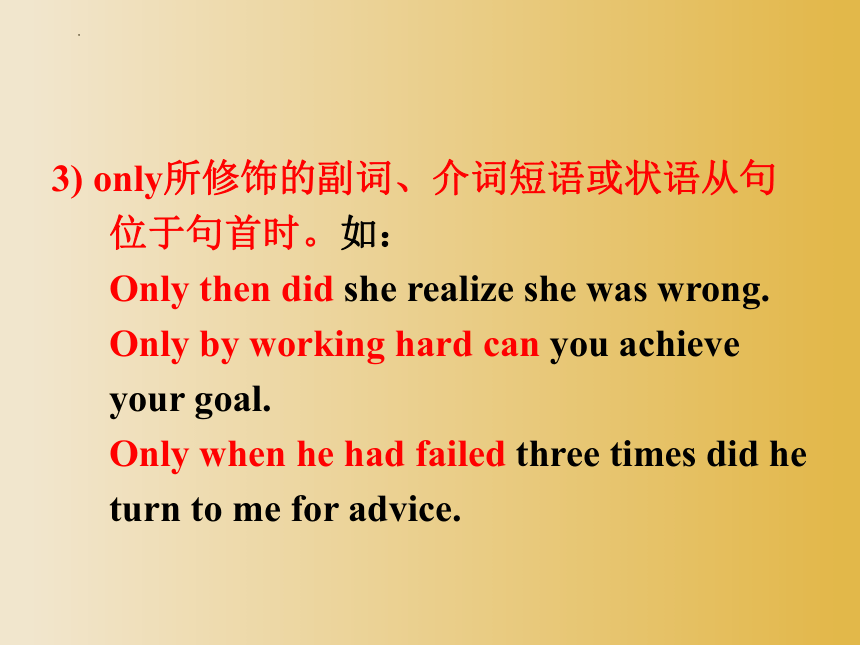


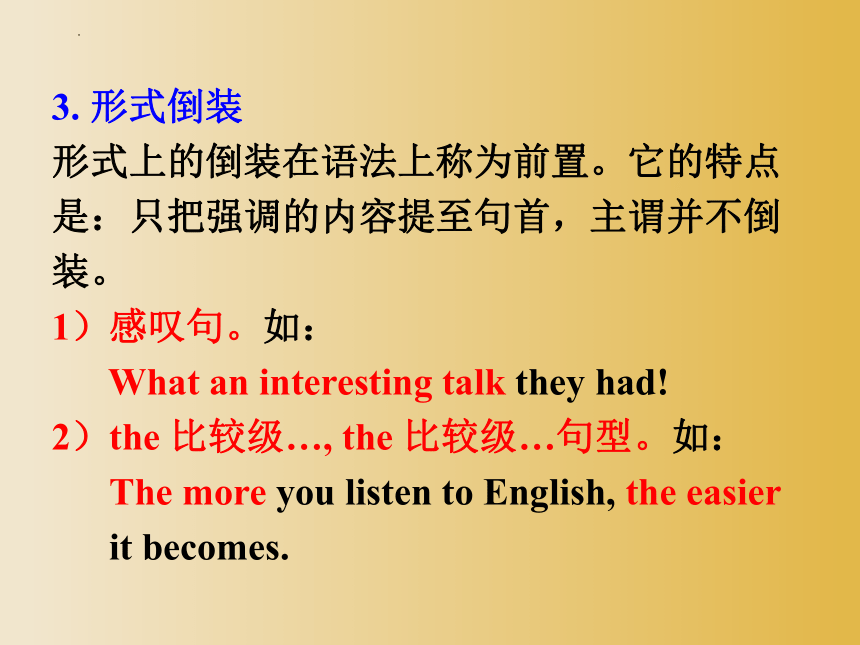
文档简介
(共46张PPT)
倒装、强调、省略
倒装
1. 完全倒装
完全倒装是把句子的谓语全部置于主语之前。在下面几种情况下多用完全倒装:
1)在there be结构中。如:
John opened the door. There was a girl he
had never seen before.
2)以here, now, then, out, in, up, down,
off, away, off, in the room, on the wall等表
示地点、方位或时间的副词或介词短语置
于句首,且主语是名词时。如:
Down came the hammer and out flew the
sparks.
Out rushed a little boy with a wooden gun
from behind the tree.
注意:
当句子的主语是代词时,主谓不倒装。如:
There you are. I've been looking for you.
3)作表语的形容词、过去分词等位于句首且
主语为名词时。如:
Present at the party were many world-
famous singers.
Gone are the days when they could do
what they liked to the people in the country.
2. 部分倒装
部分倒装是把谓语的一部分(be动词、助动词或情态动词)提到主语之前。使用部分倒装的情况有:
1) 含否定意义的词(如not, nor, never,
seldom, hardly, rarely, little, few, nowhere,
nothing)置于句首时。如:
Only in this way can we learn English well.
Never has any country made so much
progress in such a short time.
2) 表示否定意义的介词短语(at no time, under/
in no circumstances, in no case, by no means,
on no condition)置于句首时。如:
Under no circumstances will China be the
first to use nuclear weapons.
On no account can we lose our confidence.
3) only所修饰的副词、介词短语或状语从句
位于句首时。如:
Only then did she realize she was wrong.
Only by working hard can you achieve
your goal.
Only when he had failed three times did he
turn to me for advice.
4) So+adj./ adv.+部分倒装+that
Such(a/an)+adj+n.+部分倒装+that
e.g. Such a fine day is it that we’d like to
play outside.
5) “Neither+部分倒装, nor+部分倒装”表示
“既不……, 也不……”。
e.g. Neither do I know it, no do I care about it.
6) “Not only+部分倒装, but also…”表示
“不仅……, 而且……”。
e.g. Not only will help be given to people to find jobs, but also medical treatment will be provided for people who need it.
7) Not until作状语或引导状语从句置于句首
时,句子/主句需部分倒装。
e.g. Not until 4:00 in the morning could he fall a sleep.
3. 形式倒装
形式上的倒装在语法上称为前置。它的特点是:只把强调的内容提至句首,主谓并不倒装。
1)感叹句。如:
What an interesting talk they had!
2)the 比较级…, the 比较级…句型。如:
The more you listen to English, the easier
it becomes.
3)whatever/ however…引导的让步状语从句。
如:
However difficult the problem may be, we
must work it out this evening.
4)as, though引导让步状语从句时采用倒装形
式的情况。
① 表语的倒装。如:
Tired as/ though he was, he still went on
with his work.
② 谓语动词的倒装。如:
Try as he might, he didn’t pass the exam.
③ 状语的倒装。如:
Much as he likes the bike, he doesn’t
want to buy it.
4. 其它情况
当表示前面提出的某一情况也同样适用于
后者时,通常要用“so / neither / nor +系
动词/助动词/情态动词+主语”结构。如:
He has passed the chemistry exam, and so
have I.
—I can't understand a word of it.
—Neither can I.
为了使语言简洁,人们常把某些词省略掉。被省略的部分可能是主语、主语和谓语、谓语或谓语的一部分、宾语等。有时句子的大部分都省略。常见的省略情况有:
省略
1. 简单句中的省略
简单句中,可以省略谓语或主语。另外,也可省略宾语等其他成分。如:
(Come) This way, please.
(You) Open the door, please.
—Do you know Mr. Li
—I don’t know (him).
2. 并列句中的省略
在由并列连词and, but, or等连接的并列句中,后边的分句中可以省略与前边分句中相同的成分,以避免重复。如:
He majors in English and I (major in) French.
She was poor but (she was) honest.
3. 复合句中的省略
1)当状语从句的主语与主句的主语一致,
且从句谓语含有be时,从句的主语和be
可以省略。如:
Once (it is) published, the book caused a
remarkable stir.
2)当状语从句的主语和谓语是it is / was 时,
it is / was常被省略。如:
They will try to put the plan into practice
as quickly as (it is) possible.
3)在限制性定语从句中,作宾语的关系代
词that, which, whom, who等常可以省略。
如:
Ray is a person (who / whom / that) you
can rely on.
I can't find the books (that / which) I got
from the library.
4)引导宾语从句的连词that常被省略。如:
He told me (that) he had a large family to
support.
4. 不定式符号to的省略
1)主语部分含有实义动词do时,充当表语
的不定式可省略to。如:
What I want to do is sit down and have a
good rest.
2)在but和except之前有实义动词do时,其
后的不定式可省略to。如:
He can do nothing but / except lie down
and sleep.
3)几个结构相同的不定式连用时,通常只在
第一个不定式之前加不定式符号。如:
I’ve decided to get up at 6 o’clock, have
breakfast at 7 o’clock and then walk to the
company every day.
5. 如句子前面已出现过同样的动词,为避免重
复,句子后面的不定式常省去动词原形,只
保留不定式符号to。但如果在省略的不定式
结构中含有be, have时,这些词要保留。如:
Some people suggested that she consider the
matter, but she refused to (consider the matter).
—Are you a teacher
—No, but I want to be.
—Have you told Allen about the report
—Sorry, but I ought to have.
1. It is / was +被强调部分+that/who+其他成分 ...
1)该句型可用于强调除谓语以外的其它
句子成分。
否定形式:It isn’t / wasn’t +被强调部
分+ that/who+其他成分 ...
一般疑问句形式:Is / Was it + 被强调部分
+that/who+其他成分 ...
特殊疑问句形式:疑问词+ is / was it that+
其他成分
强调
2)not ... until ...的强调句形式为It is / was
not until ... that ...。如:
It was not until he took off his dark
glasses that I recognized him.
2. do / does / did+动词原形
需要强调谓语时,需借用助动词do / does / did,且一般只用于一般现在时和一般过去时的肯定句中。如:
The little girl does want to see her mother.
I did go to see her, but she wasn’t in.
1. The professor warned the students that on no account ______ use mobile phones in his class. (2019天津)
A. should they B. they should
C. dare they D. they dare
2. It was only when the car pulled up in front of our house ______ we saw Lily in the passenger seat. (2018天津)
A. which B. that
C. when D. where
3. It was when I got back to my apartment ______ (who / where / that) I first came across my new neighbors. (2017天津)
that
I. 根据提示词将下列句子改写为倒装句。
1. I have not often heard such an inspiring speech.
→Seldom _________________________________.
2. Almost immediately after I had started my
lunch, a client arrived to see me.
→No sooner _______________________________
_______________________________.
3. Her words didn’t seem important at the time,
but they did seem important later.
→Only _________________________________.
have I heard such an inspiring speech
had I started my lunch than a client arrived to see me
later did her words seem important
4. I have never been so confused by a lecture
before.
→Never _________________________________.
5. She didn't ask me once how I felt about the
accident.
→Not once ______________________________
______________________________________.
6. You shouldn’t sign those papers under any
circumstances.
→Under no circumstances
_________________________________.
have I been so confused by a lecture before
should you sign these papers
did she ask me how I felt about the accident
Example: We're packing our bags and hoping to leave soon.
II. 根据示例选用方框内合适的内容,将其简化并填入下面的横线上(每项限用一次)。
we are hoping to leave soon
she wouldn’t tell us what she found
she didn’t want to come with us
the others hadn’t been there
She’s working in Boston
he didn’t help us move it
we can go by train
I sat in the back
1. We can go to Edinburgh by bus or
________________.
2. Elizabeth is working in New York
or ________________.
3. I invited Malia to come with us,
but ________________.
she didn’t want to
in Boston
by train
we are hoping to leave soon
she wouldn’t tell us what she found
she didn’t want to come with us
the others hadn’t been there
She’s working in Boston
he didn’t help us move it
we can go by train
I sat in the back
4. Lucy found something, but
_____________________.
5. We had already been to Athens, but
________________.
the others hadn’t
wouldn’t tell tell what
we are hoping to leave soon
she wouldn’t tell us what she found
she didn’t want to come with us
the others hadn’t been there
She’s working in Boston
he didn’t help us move it
we can go by train
I sat in the back
6. Chris could have helped us move the table, but
________________.
7. My grandparents sat in the front and
________________.
I in the back
he didn’t
we are hoping to leave soon
she wouldn’t tell us what she found
she didn’t want to come with us
the others hadn’t been there
She’s working in Boston
he didn’t help us move it
we can go by train
I sat in the back
III. 简化画线部分。
① He put the money on the table and he sat down. The woman looked over at him and smiled. ② Her smile said she was in charge and she could take his money if she wanted to take his money. Of course she could, he thought, but obviously she didn't want to yet. The smile lingered (停留) for a moment or two longer, then disappeared.
①_______________________________________
②_______________________________________
_______________________________________
He put the money on the table and sat down.
Her smile said she was in charge and she could take his money if she wanted
“③ I asked you to pay me a thousand and you agreed to pay me a thousand. This is only five hundred.”
“④I'll give you half of your thousand now and I'll give you the other half of your thousand later when I get the orchid (兰花).”
③ _______________________________________
_______________________________________
④ _______________________________________
_______________________________________
I asked you to pay me a thousand and you agreed.
I’ll give you half of your thousand now and the other when I get the orchid.
“I could find someone else who'd want to buy it.”
“⑤ You won't find someone else who'd want to buy it. Nobody else is even looking for this orchid.”
⑤___________________________________
You won’t.
IV. 选用括号内合适的内容完成下面短文。
Only occasionally 1. ________ (did Mary, Mary did) find herself reading someone else’s newspaper, over their shoulder, as she sat in the station waiting room. Mostly 2. ________ (she was, was she) just not very interested, nor 3. ________ (she was, was she) willing to risk getting caught. Why 4. ________ (it is, is it) so embarrassing to get caught doing that, she asked herself. It isn't against the law or anything.
did Mary
she was
was she
it is
But facing her today 5. _____________ (something was, was something) that really caught her attention. One of our greatest fears in modern life, the headline said, was having to speak in public. The article offered ways to develop your confidence.
Seldom 6. ________ (she had, had she) ever had to speak to an audience, but 7. ________ (it was, was it) her turn to give a ten-minute presentation in her Spanish class that afternoon.
was something
had she
it was
Not only 8. __________ (she would, would she) have to speak to an audience, but 9. ________ (she would, would she) have to do it in a foreign language. She felt the room getting hotter as she leaned forward to get a closer look. Suddenly blocking her view 10. ________ (part was, was part) of a large black beard and the big nose of the newspaper's owner. “Oops. Oh, 11. ________ (here comes, comes here) my train,” she said quickly, as she stood up and stumbled towards the door.
would she
she would
here comes
was part
“Public speaking isn't scary,” she thought to herself, “12. ________ (it is, is it) public reading that makes me really nervous.”
it is
V. 根据所提供的信息,用强调句完成下列句子。
Mrs Jones lost her purse. A policeman is asking her questions.
Policeman: Who did you go shopping with
Mrs Jones: My husband.
①It was my husband _________________________________________.
Policeman: Where did you leave your purse
Mrs Jones: At the grocer's.
②It was at the grocer's _________________________________________.
that I went shopping with
that I left my purse
Policeman: When did you realise you'd left it
there
Mrs Jones: An hour ago.
③It was an hour ago _________________________________________.
Policeman: Are you sure that you left it there
Mrs Jones: Yes, I left it there.
④It was there _________________________________________.
that I realised I’d left it there
that I left it
Policeman: What was in your purse
Mrs Jones: My bank cards.
⑤It was my bank cards _________________________________________.
Policeman: Did you cancel your bank cards
Mrs Jones: Yes, just before I saw you.
⑥It was just before I saw you _________________________________________.
that were in my purse
that I cancelled my bank cards
倒装、强调、省略
倒装
1. 完全倒装
完全倒装是把句子的谓语全部置于主语之前。在下面几种情况下多用完全倒装:
1)在there be结构中。如:
John opened the door. There was a girl he
had never seen before.
2)以here, now, then, out, in, up, down,
off, away, off, in the room, on the wall等表
示地点、方位或时间的副词或介词短语置
于句首,且主语是名词时。如:
Down came the hammer and out flew the
sparks.
Out rushed a little boy with a wooden gun
from behind the tree.
注意:
当句子的主语是代词时,主谓不倒装。如:
There you are. I've been looking for you.
3)作表语的形容词、过去分词等位于句首且
主语为名词时。如:
Present at the party were many world-
famous singers.
Gone are the days when they could do
what they liked to the people in the country.
2. 部分倒装
部分倒装是把谓语的一部分(be动词、助动词或情态动词)提到主语之前。使用部分倒装的情况有:
1) 含否定意义的词(如not, nor, never,
seldom, hardly, rarely, little, few, nowhere,
nothing)置于句首时。如:
Only in this way can we learn English well.
Never has any country made so much
progress in such a short time.
2) 表示否定意义的介词短语(at no time, under/
in no circumstances, in no case, by no means,
on no condition)置于句首时。如:
Under no circumstances will China be the
first to use nuclear weapons.
On no account can we lose our confidence.
3) only所修饰的副词、介词短语或状语从句
位于句首时。如:
Only then did she realize she was wrong.
Only by working hard can you achieve
your goal.
Only when he had failed three times did he
turn to me for advice.
4) So+adj./ adv.+部分倒装+that
Such(a/an)+adj+n.+部分倒装+that
e.g. Such a fine day is it that we’d like to
play outside.
5) “Neither+部分倒装, nor+部分倒装”表示
“既不……, 也不……”。
e.g. Neither do I know it, no do I care about it.
6) “Not only+部分倒装, but also…”表示
“不仅……, 而且……”。
e.g. Not only will help be given to people to find jobs, but also medical treatment will be provided for people who need it.
7) Not until作状语或引导状语从句置于句首
时,句子/主句需部分倒装。
e.g. Not until 4:00 in the morning could he fall a sleep.
3. 形式倒装
形式上的倒装在语法上称为前置。它的特点是:只把强调的内容提至句首,主谓并不倒装。
1)感叹句。如:
What an interesting talk they had!
2)the 比较级…, the 比较级…句型。如:
The more you listen to English, the easier
it becomes.
3)whatever/ however…引导的让步状语从句。
如:
However difficult the problem may be, we
must work it out this evening.
4)as, though引导让步状语从句时采用倒装形
式的情况。
① 表语的倒装。如:
Tired as/ though he was, he still went on
with his work.
② 谓语动词的倒装。如:
Try as he might, he didn’t pass the exam.
③ 状语的倒装。如:
Much as he likes the bike, he doesn’t
want to buy it.
4. 其它情况
当表示前面提出的某一情况也同样适用于
后者时,通常要用“so / neither / nor +系
动词/助动词/情态动词+主语”结构。如:
He has passed the chemistry exam, and so
have I.
—I can't understand a word of it.
—Neither can I.
为了使语言简洁,人们常把某些词省略掉。被省略的部分可能是主语、主语和谓语、谓语或谓语的一部分、宾语等。有时句子的大部分都省略。常见的省略情况有:
省略
1. 简单句中的省略
简单句中,可以省略谓语或主语。另外,也可省略宾语等其他成分。如:
(Come) This way, please.
(You) Open the door, please.
—Do you know Mr. Li
—I don’t know (him).
2. 并列句中的省略
在由并列连词and, but, or等连接的并列句中,后边的分句中可以省略与前边分句中相同的成分,以避免重复。如:
He majors in English and I (major in) French.
She was poor but (she was) honest.
3. 复合句中的省略
1)当状语从句的主语与主句的主语一致,
且从句谓语含有be时,从句的主语和be
可以省略。如:
Once (it is) published, the book caused a
remarkable stir.
2)当状语从句的主语和谓语是it is / was 时,
it is / was常被省略。如:
They will try to put the plan into practice
as quickly as (it is) possible.
3)在限制性定语从句中,作宾语的关系代
词that, which, whom, who等常可以省略。
如:
Ray is a person (who / whom / that) you
can rely on.
I can't find the books (that / which) I got
from the library.
4)引导宾语从句的连词that常被省略。如:
He told me (that) he had a large family to
support.
4. 不定式符号to的省略
1)主语部分含有实义动词do时,充当表语
的不定式可省略to。如:
What I want to do is sit down and have a
good rest.
2)在but和except之前有实义动词do时,其
后的不定式可省略to。如:
He can do nothing but / except lie down
and sleep.
3)几个结构相同的不定式连用时,通常只在
第一个不定式之前加不定式符号。如:
I’ve decided to get up at 6 o’clock, have
breakfast at 7 o’clock and then walk to the
company every day.
5. 如句子前面已出现过同样的动词,为避免重
复,句子后面的不定式常省去动词原形,只
保留不定式符号to。但如果在省略的不定式
结构中含有be, have时,这些词要保留。如:
Some people suggested that she consider the
matter, but she refused to (consider the matter).
—Are you a teacher
—No, but I want to be.
—Have you told Allen about the report
—Sorry, but I ought to have.
1. It is / was +被强调部分+that/who+其他成分 ...
1)该句型可用于强调除谓语以外的其它
句子成分。
否定形式:It isn’t / wasn’t +被强调部
分+ that/who+其他成分 ...
一般疑问句形式:Is / Was it + 被强调部分
+that/who+其他成分 ...
特殊疑问句形式:疑问词+ is / was it that+
其他成分
强调
2)not ... until ...的强调句形式为It is / was
not until ... that ...。如:
It was not until he took off his dark
glasses that I recognized him.
2. do / does / did+动词原形
需要强调谓语时,需借用助动词do / does / did,且一般只用于一般现在时和一般过去时的肯定句中。如:
The little girl does want to see her mother.
I did go to see her, but she wasn’t in.
1. The professor warned the students that on no account ______ use mobile phones in his class. (2019天津)
A. should they B. they should
C. dare they D. they dare
2. It was only when the car pulled up in front of our house ______ we saw Lily in the passenger seat. (2018天津)
A. which B. that
C. when D. where
3. It was when I got back to my apartment ______ (who / where / that) I first came across my new neighbors. (2017天津)
that
I. 根据提示词将下列句子改写为倒装句。
1. I have not often heard such an inspiring speech.
→Seldom _________________________________.
2. Almost immediately after I had started my
lunch, a client arrived to see me.
→No sooner _______________________________
_______________________________.
3. Her words didn’t seem important at the time,
but they did seem important later.
→Only _________________________________.
have I heard such an inspiring speech
had I started my lunch than a client arrived to see me
later did her words seem important
4. I have never been so confused by a lecture
before.
→Never _________________________________.
5. She didn't ask me once how I felt about the
accident.
→Not once ______________________________
______________________________________.
6. You shouldn’t sign those papers under any
circumstances.
→Under no circumstances
_________________________________.
have I been so confused by a lecture before
should you sign these papers
did she ask me how I felt about the accident
Example: We're packing our bags and hoping to leave soon.
II. 根据示例选用方框内合适的内容,将其简化并填入下面的横线上(每项限用一次)。
we are hoping to leave soon
she wouldn’t tell us what she found
she didn’t want to come with us
the others hadn’t been there
She’s working in Boston
he didn’t help us move it
we can go by train
I sat in the back
1. We can go to Edinburgh by bus or
________________.
2. Elizabeth is working in New York
or ________________.
3. I invited Malia to come with us,
but ________________.
she didn’t want to
in Boston
by train
we are hoping to leave soon
she wouldn’t tell us what she found
she didn’t want to come with us
the others hadn’t been there
She’s working in Boston
he didn’t help us move it
we can go by train
I sat in the back
4. Lucy found something, but
_____________________.
5. We had already been to Athens, but
________________.
the others hadn’t
wouldn’t tell tell what
we are hoping to leave soon
she wouldn’t tell us what she found
she didn’t want to come with us
the others hadn’t been there
She’s working in Boston
he didn’t help us move it
we can go by train
I sat in the back
6. Chris could have helped us move the table, but
________________.
7. My grandparents sat in the front and
________________.
I in the back
he didn’t
we are hoping to leave soon
she wouldn’t tell us what she found
she didn’t want to come with us
the others hadn’t been there
She’s working in Boston
he didn’t help us move it
we can go by train
I sat in the back
III. 简化画线部分。
① He put the money on the table and he sat down. The woman looked over at him and smiled. ② Her smile said she was in charge and she could take his money if she wanted to take his money. Of course she could, he thought, but obviously she didn't want to yet. The smile lingered (停留) for a moment or two longer, then disappeared.
①_______________________________________
②_______________________________________
_______________________________________
He put the money on the table and sat down.
Her smile said she was in charge and she could take his money if she wanted
“③ I asked you to pay me a thousand and you agreed to pay me a thousand. This is only five hundred.”
“④I'll give you half of your thousand now and I'll give you the other half of your thousand later when I get the orchid (兰花).”
③ _______________________________________
_______________________________________
④ _______________________________________
_______________________________________
I asked you to pay me a thousand and you agreed.
I’ll give you half of your thousand now and the other when I get the orchid.
“I could find someone else who'd want to buy it.”
“⑤ You won't find someone else who'd want to buy it. Nobody else is even looking for this orchid.”
⑤___________________________________
You won’t.
IV. 选用括号内合适的内容完成下面短文。
Only occasionally 1. ________ (did Mary, Mary did) find herself reading someone else’s newspaper, over their shoulder, as she sat in the station waiting room. Mostly 2. ________ (she was, was she) just not very interested, nor 3. ________ (she was, was she) willing to risk getting caught. Why 4. ________ (it is, is it) so embarrassing to get caught doing that, she asked herself. It isn't against the law or anything.
did Mary
she was
was she
it is
But facing her today 5. _____________ (something was, was something) that really caught her attention. One of our greatest fears in modern life, the headline said, was having to speak in public. The article offered ways to develop your confidence.
Seldom 6. ________ (she had, had she) ever had to speak to an audience, but 7. ________ (it was, was it) her turn to give a ten-minute presentation in her Spanish class that afternoon.
was something
had she
it was
Not only 8. __________ (she would, would she) have to speak to an audience, but 9. ________ (she would, would she) have to do it in a foreign language. She felt the room getting hotter as she leaned forward to get a closer look. Suddenly blocking her view 10. ________ (part was, was part) of a large black beard and the big nose of the newspaper's owner. “Oops. Oh, 11. ________ (here comes, comes here) my train,” she said quickly, as she stood up and stumbled towards the door.
would she
she would
here comes
was part
“Public speaking isn't scary,” she thought to herself, “12. ________ (it is, is it) public reading that makes me really nervous.”
it is
V. 根据所提供的信息,用强调句完成下列句子。
Mrs Jones lost her purse. A policeman is asking her questions.
Policeman: Who did you go shopping with
Mrs Jones: My husband.
①It was my husband _________________________________________.
Policeman: Where did you leave your purse
Mrs Jones: At the grocer's.
②It was at the grocer's _________________________________________.
that I went shopping with
that I left my purse
Policeman: When did you realise you'd left it
there
Mrs Jones: An hour ago.
③It was an hour ago _________________________________________.
Policeman: Are you sure that you left it there
Mrs Jones: Yes, I left it there.
④It was there _________________________________________.
that I realised I’d left it there
that I left it
Policeman: What was in your purse
Mrs Jones: My bank cards.
⑤It was my bank cards _________________________________________.
Policeman: Did you cancel your bank cards
Mrs Jones: Yes, just before I saw you.
⑥It was just before I saw you _________________________________________.
that were in my purse
that I cancelled my bank cards
